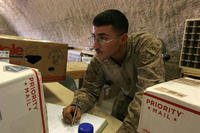I never want to forget Mary Jo Coleman. Just because she didn't die in war doesn't mean she doesn't count.
When Dave ‘Bulldog’ Coleman, her high school sweetheart, told her four days before he left for basic training in the early 1960's that he had joined the Army, she sobbed in the car. When he returned for a few days of leave before heading out for Special Forces training -- before “special forces” was even really a thing -- she married him on day one, drove to Fort Bragg, N.C. day two and said ‘good-bye’ on day three.
During his deployment to Okinawa, Japan, where First Group based their Vietnam operations, she received three, two-minute phone calls from him over 22 months. Sometimes she received 20 letters at once. Sometimes she received none.
And when he returned in June of 1969, she opened the door to a changed man. He had seen things he could not, would not, talk about. And he had returned home to a nation that hated him.
“When we arrived in San Francisco the bus driver told us that if there were protests he could open the door but he couldn’t stop. … He opened the door and we jumped off one by one,” Coleman said. “There was a group of people of my generation at the door of that entrance, and that was my ‘welcome home.’ They were throwing stuff at us, cussing at us, beating us with signs, and that was my ‘welcome home.’
“And I think that moment was the beginning of my [Post Traumatic Stress].”
It was also the beginning of Mary Jo’s secondary PTS.
Coleman spent the next several decades looking for a way to soothe his mind. Thrill-seeking, alcohol and pouring himself into his children’s activities took up his days, and sleepless nights countered them.
They didn’t know that PTS was a real thing, a real side effect of stress, separation, loss and combat trauma.
In 2005 Mary Jo committed suicide – almost 40 years after her husband returned home.
Memorial Day is set aside to remember those who died in service to their country. But on this one, I am pausing to remember Mary Jo and other family members like her. She never deployed. She never looked down the barrel of a gun.
But her war wounds were real, too. And even almost 40 years after she could no longer call herself a military family member, they still haunted her.
If there is one thing I have learned this year it is that deployment does not end when the service members come home – not for them and not for their families. Addiction, self-destructive behavior, relationship problems and more haunt us. And it doesn't stop after the transition.
These are the tolls of wars both past and present.
“If you think your pack is filled by PTS, look at your spouse,” Coleman told a group of soldiers at a recent retreat in Tennessee. “Her pack is just as full.”
Every day, 22 veterans commit suicide. But, as CNN’s excellent expose “The Uncounted,” pointed out, no one is counting the families.
No one has counted Mary Jo.
On this Memorial Day pause to remember those we have forgotten. Because we are so good as a community about remembering those who have fallen in “normal” battle.
Let’s also remember those who fall at home.










